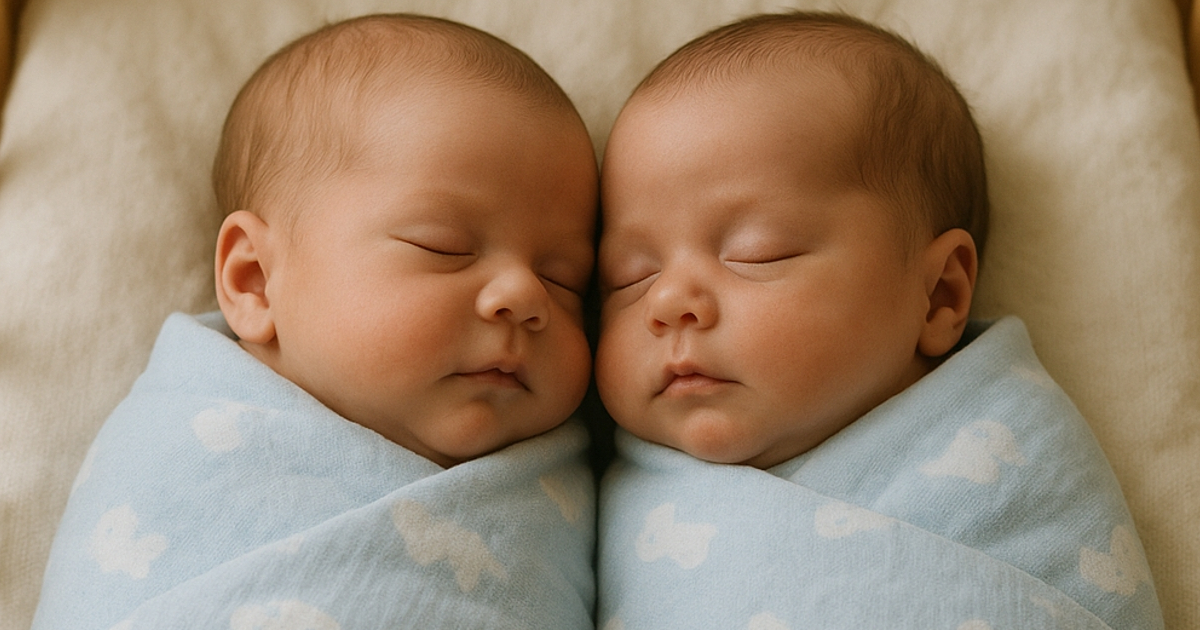When the heart makes its choice, logic stays silent.
“Luca, it’s twins!” Anna cried into the phone. “Two boys, each about five and a half pounds, but healthy. Everything’s fine!”
“The ultrasound said…” he murmured, his voice flat. “Boys, huh?”
“Yes,” she smiled through tears. “Our babies.”
The pregnancy became a trial for Anna—both physical and emotional. Luca, a driver at their small company, had never wanted children. Their story hadn’t started with love, but with a need to forget. He had recently been betrayed: his fiancée, Clara, had cheated on him with a friend. Luca couldn’t bear it, broke off the engagement, and simply sought to numb the pain.
Anna, a young accountant with fiery hair and an innocent heart, became his refuge—though she didn’t yet know the cost.

She had always been overlooked: freckles, unruly hair, a gentle demeanor. Luca was her first man, first kiss, first dream. She fell in love, while he simply wanted peace.
When Anna became pregnant, everything surfaced. Luca panicked, but his mother insisted—they had to marry. They wed quietly, no dresses, no toasts—just a small ceremony in the garden. Anna shone. Luca remained silent.
He began staying late “at work” more and more, avoiding both his wife and her growing belly. She, on the other hand, dreamed of the future. Believed love could be nurtured, like a tree, if watered with patience.
Then one day, Clara reappeared.
“Now I understand Luca,” she said coldly, sizing Anna up. “You’re not really his type.”
“But we have children,” Anna said, voice trembling.
“You made this choice yourself. He never wanted it,” Clara smirked.
Her words hit harder than a slap. That same day, Anna ended up in the hospital.
Even so, she called him later—softly, as if afraid to scare fate away:
“Luca, come. They look like you. So much like you.”
He promised. But he didn’t come.
Thus began her life without her husband, but with two infants.
Her mother-in-law helped, while Luca increasingly vanished with Clara. In the small town, everyone knew. Only Anna pretended otherwise—until one night she packed her things, tears streaming:
“I can’t do this anymore…”
Luca didn’t stop her. He simply said:
“I’ll leave on my own.”
And he left.
For his lover.

Years passed. The children grew, and Anna seemed to blossom. She became confident, elegant, beautiful. When Luca visited his mother one day, he couldn’t believe his eyes: standing before him was not the timid girl he had married, but a strong, radiant mother.
“You’ve changed,” he said awkwardly, smiling.
“Thank you,” she replied calmly.
From then on, he started coming around more often—first for the children, then just to see her.
Clara raged, throwing tantrums.
“Divorce her!” she yelled.
“Not while the kids are young,” he replied.
And then, quietly to himself: “I don’t even want to.”
When Clara, tired of his doubts, left for a vacation with another man, Luca packed his bag and returned home.
Anna ran to him, unable to hold back tears.
“I knew you’d come back,” she whispered.
The family was together again.
Clara, sitting in a seaside café, looked at the new ring on his finger and thought:
“Without love, life’s easier. It hurts less.”
And that same evening, Anna gently stroked her sons’ heads and thought:
“Love isn’t weakness. It’s strength—if you know how to forgive.”
And each of them had been right in her own way.
